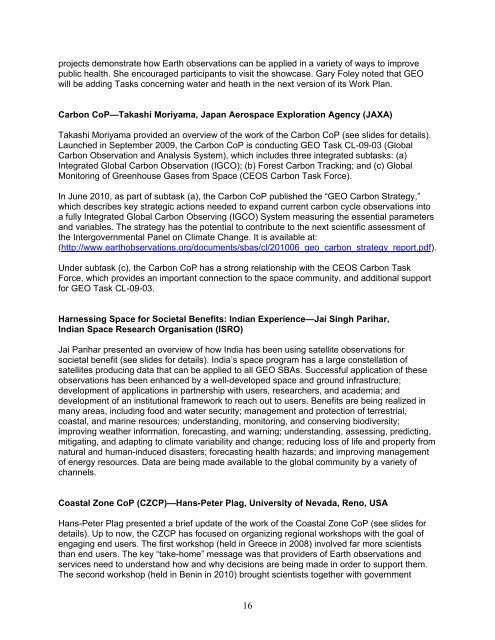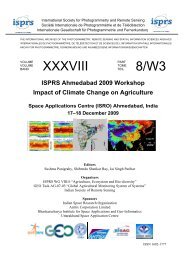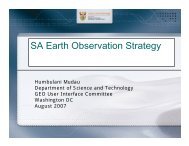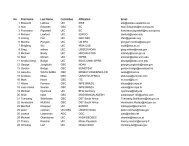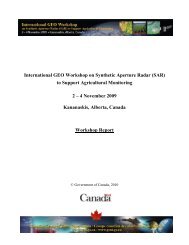GEO UIC Committee: - Group on Earth Observations
GEO UIC Committee: - Group on Earth Observations
GEO UIC Committee: - Group on Earth Observations
Create successful ePaper yourself
Turn your PDF publications into a flip-book with our unique Google optimized e-Paper software.
projects dem<strong>on</strong>strate how <strong>Earth</strong> observati<strong>on</strong>s can be applied in a variety of ways to improve<br />
public health. She encouraged participants to visit the showcase. Gary Foley noted that <str<strong>on</strong>g>GEO</str<strong>on</strong>g><br />
will be adding Tasks c<strong>on</strong>cerning water and heath in the next versi<strong>on</strong> of its Work Plan.<br />
Carb<strong>on</strong> CoP—Takashi Moriyama, Japan Aerospace Explorati<strong>on</strong> Agency (JAXA)<br />
Takashi Moriyama provided an overview of the work of the Carb<strong>on</strong> CoP (see slides for details).<br />
Launched in September 2009, the Carb<strong>on</strong> CoP is c<strong>on</strong>ducting <str<strong>on</strong>g>GEO</str<strong>on</strong>g> Task CL-09-03 (Global<br />
Carb<strong>on</strong> Observati<strong>on</strong> and Analysis System), which includes three integrated subtasks: (a)<br />
Integrated Global Carb<strong>on</strong> Observati<strong>on</strong> (IGCO); (b) Forest Carb<strong>on</strong> Tracking; and (c) Global<br />
M<strong>on</strong>itoring of Greenhouse Gases from Space (CEOS Carb<strong>on</strong> Task Force).<br />
In June 2010, as part of subtask (a), the Carb<strong>on</strong> CoP published the “<str<strong>on</strong>g>GEO</str<strong>on</strong>g> Carb<strong>on</strong> Strategy,”<br />
which describes key strategic acti<strong>on</strong>s needed to expand current carb<strong>on</strong> cycle observati<strong>on</strong>s into<br />
a fully Integrated Global Carb<strong>on</strong> Observing (IGCO) System measuring the essential parameters<br />
and variables. The strategy has the potential to c<strong>on</strong>tribute to the next scientific assessment of<br />
the Intergovernmental Panel <strong>on</strong> Climate Change. It is available at:<br />
(http://www.earthobservati<strong>on</strong>s.org/documents/sbas/cl/201006_geo_carb<strong>on</strong>_strategy_report.pdf).<br />
Under subtask (c), the Carb<strong>on</strong> CoP has a str<strong>on</strong>g relati<strong>on</strong>ship with the CEOS Carb<strong>on</strong> Task<br />
Force, which provides an important c<strong>on</strong>necti<strong>on</strong> to the space community, and additi<strong>on</strong>al support<br />
for <str<strong>on</strong>g>GEO</str<strong>on</strong>g> Task CL-09-03.<br />
Harnessing Space for Societal Benefits: Indian Experience—Jai Singh Parihar,<br />
Indian Space Research Organisati<strong>on</strong> (ISRO)<br />
Jai Parihar presented an overview of how India has been using satellite observati<strong>on</strong>s for<br />
societal benefit (see slides for details). India’s space program has a large c<strong>on</strong>stellati<strong>on</strong> of<br />
satellites producing data that can be applied to all <str<strong>on</strong>g>GEO</str<strong>on</strong>g> SBAs. Successful applicati<strong>on</strong> of these<br />
observati<strong>on</strong>s has been enhanced by a well-developed space and ground infrastructure;<br />
development of applicati<strong>on</strong>s in partnership with users, researchers, and academia; and<br />
development of an instituti<strong>on</strong>al framework to reach out to users. Benefits are being realized in<br />
many areas, including food and water security; management and protecti<strong>on</strong> of terrestrial,<br />
coastal, and marine resources; understanding, m<strong>on</strong>itoring, and c<strong>on</strong>serving biodiversity;<br />
improving weather informati<strong>on</strong>, forecasting, and warning; understanding, assessing, predicting,<br />
mitigating, and adapting to climate variability and change; reducing loss of life and property from<br />
natural and human-induced disasters; forecasting health hazards; and improving management<br />
of energy resources. Data are being made available to the global community by a variety of<br />
channels.<br />
Coastal Z<strong>on</strong>e CoP (CZCP)—Hans-Peter Plag, University of Nevada, Reno, USA<br />
Hans-Peter Plag presented a brief update of the work of the Coastal Z<strong>on</strong>e CoP (see slides for<br />
details). Up to now, the CZCP has focused <strong>on</strong> organizing regi<strong>on</strong>al workshops with the goal of<br />
engaging end users. The first workshop (held in Greece in 2008) involved far more scientists<br />
than end users. The key “take-home” message was that providers of <strong>Earth</strong> observati<strong>on</strong>s and<br />
services need to understand how and why decisi<strong>on</strong>s are being made in order to support them.<br />
The sec<strong>on</strong>d workshop (held in Benin in 2010) brought scientists together with government<br />
16


